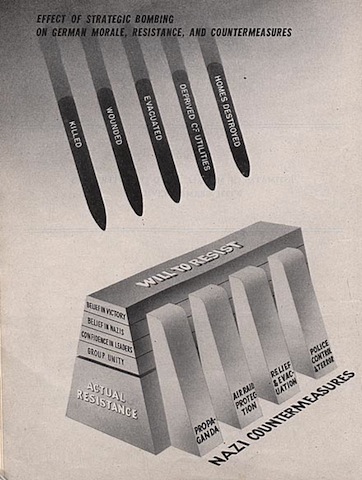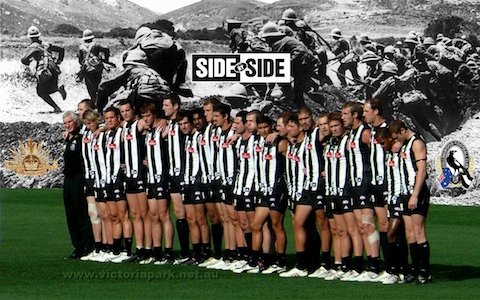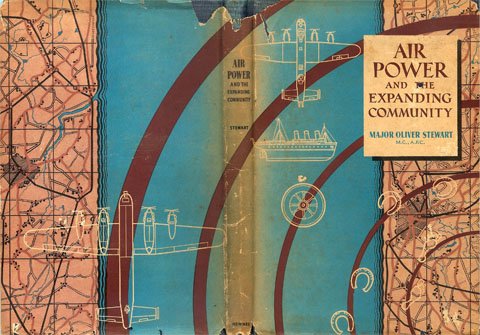
Breaking the morale of a civilian population by means of aerial bombardment is quite difficult. But it’s a lot easier if you only have to do it in graphical form. Here bombs of type ‘killed’, ‘wounded’, ‘evacuated’, ‘deprived of utilities’ and ‘homes destroyed’ come thundering down towards the edifice ‘will to resist’, which is formed of layers ‘belief in victory’, ‘belief in Nazis’, ‘confidence in leaders’, ‘group unity’ and ‘actual resistance’, and buttressed by the Nazi countermeasures ‘propaganda’, ‘air raid protection’, ‘relief & evacuation’ and ‘police control & terror’. Will the Allied bombs shatter German morale? Looks to me like it will!
This is taken from the United States Strategic Bombing Survey (USSB), The Effects of Strategic Bombing on German Morale (Washington, D.C.: Government Printing Office, 1947), volume 1, 6. However, I came across it (by way of Wikipedia) on the website of the UK National Archives, as part of an exercise for students about the bombing of Dresden. I find it interesting, and perhaps telling, that a British government website would use an American image to illustrate wartime beliefs about the susceptibility of morale to bombing. There was a British version of the USSBS, the British Bombing Survey Unit (BBSU), headed by zoologist Solly Zuckerman, but any comparison between them is undone by the differences in scale. The USSBS employed more than a thousand researchers for two years at the end of the war and published 208 reports on the European theatre alone; the BBSU comprised a few dozen people working for just a few months in 1945, producing a single report which wasn’t even published until 1998. For the BBSU to have hired a graphic artist to come up with something like the above would probably would have consumed a considerable fraction of its resources. Nor was it necessary. The USSBS was a genuine research effort, but it was also propaganda for an independent air force (which the USAAF became in 1947, turning into the USAF). The BBSU was far humbler in its aims. Churchill wanted a quick and dirty assessment of the Combined Bomber Offensive ready in time for Bomber Command’s redeployment to the far East for use against Japan (which of course never happened). The RAF’s leaders, notably the Chief of Air Staff, Sir Charles Portal, were reluctant to let the Americans write the history of the bomber war. But, with the possible exception of Bomber Command’s airmen, pretty much everyone else in Britain just wanted to forget about it once the war was over. And they did.
For a comparison of the USSBS and the BBSU, see Tami Davis Biddle, Rhetoric and Reality in Strategic Air Warfare: The Evolution and Reality of British and American Ideas about Strategic Bombing, 1914-1945 (Princeton and Oxford: Princeton University Press, 2002), 270-81.
![]() This work is licensed under a Creative Commons Attribution-NonCommercial-NoDerivatives 4.0 International License.
Permissions beyond the scope of this license may be available at http://airminded.org/copyright/.
This work is licensed under a Creative Commons Attribution-NonCommercial-NoDerivatives 4.0 International License.
Permissions beyond the scope of this license may be available at http://airminded.org/copyright/.




absolutely o.t.
I suppose this article, and films, may be of interest to you …
http://statehistory.ru/1603/Esli-zavtra-voyna—sovetskie-filmy-tridtsatykh-godov-o-budushchey-voyne/
Thanks, that’s very interesting… and Google Translate is very useful :)
I’m surprised anyone was still going on about breaking civilian morale by that time. How did they explain away the fact that it hadn’t happened?
Gavin, you never would have made it as a bomber commander! The reason why German morale didn’t collapse due to bombing is obviously because Germany wasn’t bombed hard enough. More bombing is always the answer.
More seriously, as I said although the USSBS had an agenda it was also intended to be useful. So (at least as I understand it, not having read it) part of the brief was to look at the effect of bombing on German morale and ask why it didn’t collapse, and whether there were any lessons which could be learned for the future.